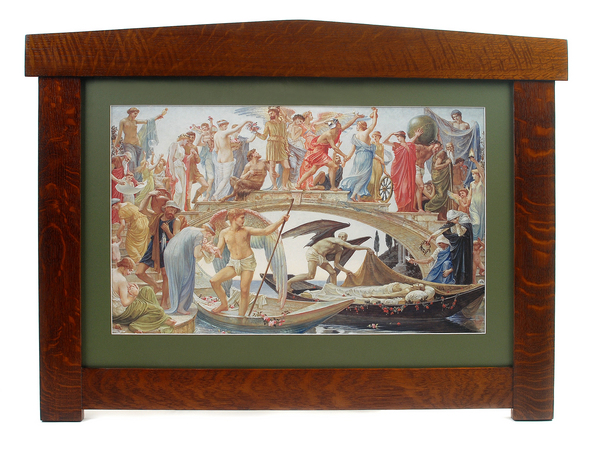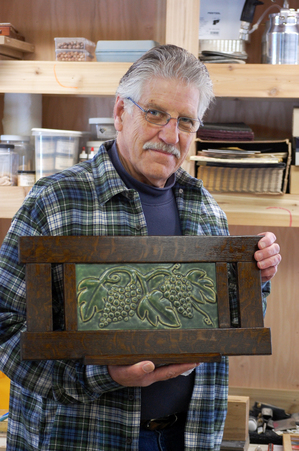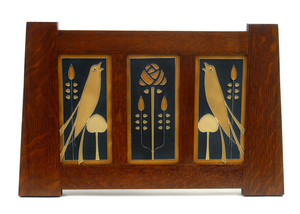Chelsea custom framemaker Heinrich Zimmer inspired by the Arts & Crafts Movement

An Arts and Crafts, custom frame made by Craig Toepfer of Heinrich Zimmer Ltd., near Chelsea.
Photo courtesy of Heinrich Zimmer Ltd
Inspired by the Arts and Crafts movement and paying homage to his maternal grandfather, Craig Toepfer creates a collection of Craftsman-style art frames that have been sold to homeowners and businesses around the country.
Toepfer designs and crafts his frames in a workshop adjacent to his home less than 10 minutes northwest of Chelsea and sells them at arts fairs, on-line and by appointment. He sells custom frames, framed art and framed tiles from two Michigan tile makers.

Craig Toepfer, the man behind fine framemaking business Heinrich Zimmer, Ltd. inside his workshop, northwest of Chelsea.
Janet Miller | For AnnArbor.com
His one-man company, Heinrich Zimmer Ltd., is named after his grandfather, who worked in a London furniture factory in the late 19th century and then came to Detroit, where he was a carpenter in some of the city’s finest homes.
It was at the height of the Arts and Crafts Movement, a stylistic period that celebrated simple lines and traditional craftsmanship and was a reaction to the Industrial Revolution.
“The Industrial Resolution turned chair makers into chair leg makers,” Toepfer. “They would make the same leg over and over again. The person who designed the chair didn’t know how to use sandpaper.”
Toepfer wants to carry on that Arts and Crafts tradition.
“It’s an old family craft. I like the Arts and Crafts Movement. There’s a warmth to it. It focused on joining the art and the craft as a common endeavor.”
Toepfer’s most popular frames are made of quartersawn white oak, known for its warm and complex grain. While quartersawn oak has come to define the Arts and Crafts Movement, it has practical roots: It was cheap and plentiful in England in the late 19th century when the movement took off. Quarter sawn simply means the wood is cut perpendicular to the surface so the growth rings show, creating a straight and even grain.
“You can look at a complete history of growth,” Toepfer said.
Heinrich Zimmer frames carry the names that rekindle the movement: There’s the C.R. Mackintosh and the William Morris, named after designers of the time. And there’s the Orient, a nod to the Asian influence on the movement. The company’s most popular style is the Harvey Ellis, named for one of the period’s most famous architects.
The most popular stain is a rich brown walnut Toepfer calls Arts and Crafts, although he offers an array of eco-friendly water- and alcohol-based stains, which he makes himself.
While Toepfer offers a dozen designs (two were recently added), they all have mortise and tenon joinery instead of the more common miter joints. “With mortise and tenon, all four sides can be different so it gives you a range of possibilities,” Toepfer said. Also, because there are tiny steps where the frame is joined, it has a depth not found in traditional art frames, he said.

A custom frame made by Craig Toepfer of Heinrich Zimmer Ltd., near Chelsea.
Photo courtesy of Heinrich Zimmer Ltd
While Heinrich Zimmer makes custom frames, the company’s biggest seller is framed Motawi tiles, Toepfer said. Motawi tiles are made in Ann Arbor. He also sells Pewabic tiles, made in Detroit since 1903. He also sells framed art prints, art posters and Giclee prints from the Arts and Crafts Movement.
While businesses, universities and hospitals have framed their public artwork in Heinrich Zimmer frames, Toepfer sells many to owners of Arts and Craft homes or homeowners who favor the style.
He came to framemaking after he retired as an engineer from Ford Motor Co. in 2001. “I took my 401(k) and invested it in woodworking equipment,” he said.
He began by making furniture — he still has half-a-dozen Crafstman-style high chairs in the attic of his workshop — but settled on frames. They are easy to transport to art fairs.
Heinrich Zimmer frames start at $75 and can run up to $400. Framed tiles start at $120. He also sells 12-inch-by-14-inch framed mirrors decorated with two tiles that cost $400. Hours are by appointment. The website is www.hzwoodworks.com/hzwoodworks/Welcome.html.
Janet Miller is a freelance writer and a frequent contributor to AnnArbor.com.


Comments
TreeTownGal
Thu, Mar 3, 2011 : 7:56 p.m.
I am in awe - these are so beautiful and authentic, they make me feel solid and welcomed when I look at them. Odd? Ah oh well.
clownfish
Thu, Mar 3, 2011 : 1:59 p.m.
Great work! Keep it up.